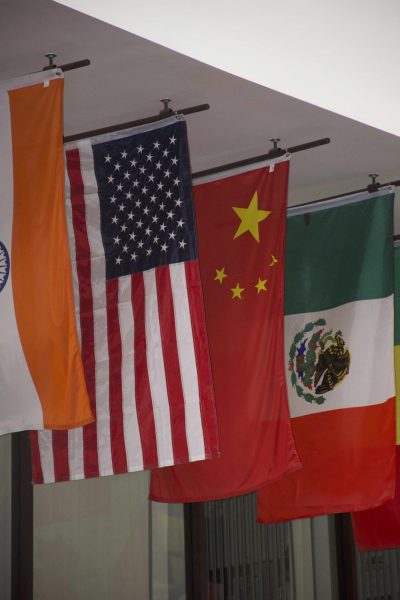Researchers and activists discussed the impact of Chinese Communist Party (CCP) repression on Chinese students’ free expression on U.S. university campuses at a Feb. 21 panel at Georgetown University.
Panelists discussed how the CCP has sought to prevent Chinese students in the United States from dissenting and the problems higher education institutions face in combating this repression. Georgetown’s Asian American Student Association, Asian studies program and Georgetown University College Democrats hosted the event.
The discussion began with Zhang Jinrui (LAW ’24), a pro-democracy student organizer, sharing his personal experience with on-campus harassment and repression.
Zhang participated in the White Paper movement, a series of protests against the Chinese government’s “zero-COVID” policies and censorship, last year, handing out flyers opposing CCP policies on Georgetown’s campus. Zhang said a member of the Georgetown branch of the Chinese Students and Scholars Association, an official organization of Chinese students studying outside of the People’s Republic of China (PRC), verbally assaulted and recorded him.
“They were on a call with someone in China, they turned the phone around to show them my face, saying, ‘Take a picture, show it to CCP police,’” Zhang said at the event.
Zhang said the Chinese police interrogated his family in China months after this harassment. He said the situation is part of a systematic wave of transnational repression targeted at Chinese overseas students in Washington, D.C.
“Immediately nothing really happened after I first spoke out, and that was around the end of 2022, nobody came to my family, they were living life as normal,” Zhang said. “That was until 2023, when there was a whole wave of harassment directed against Chinese students who were living in the D.C. area. They somehow got the contact information of a lot of these Chinese students and they began harassing them one by one.”
Zhou Fengsuo, a key student organizer in the 1989 Tiananmen Square protests, student-led demonstrations in Beijing that called for democracy and free speech, and current director of Human Rights in China, an organization supporting civil society actors by advancing and protecting human rights in the PRC, said overseas students like Zhang are essential in encouraging students living in China to dissent against authoritarian CCP policies.
“This message of ending “zero-COVID,” freedom not slavery, elections not dictatorship, was transmitted back to China and echoed within China,” Zhou said at the event. “It was mainly the overseas Chinese student organizers who were carrying out the message.”

Zhou said that many pro-democracy Chinese students in the U.S. have to live underground, hiding their true beliefs and identities, due to the threat of repression from the Chinese government.
Zhou said higher education institutions’ failure to appropriately teach about the history of censorship in China facilitates this repression.
“U.S. colleges have a lot to do with it. We experience this constantly. For example, there are so many Asian studies departments, but when was the last time we talked about Tiananmen?” Zhou said at the event. “We have institutionalized the censorship and the fear of communist China in this country and that’s the reality. We have to change it.”
Sarah McLaughlin, a senior scholar of global expression at the Foundation for Individual Rights and Expression, a free speech nonprofit that has invited controversy for its ties to conservative groups, said that it is often difficult for universities to effectively address transnational repression as they sometimes have partnerships with satellite campuses in the countries enacting the repression.
“It’s very difficult to say that, yes, we recognize our students from China are experiencing harassment and transnational repression, and also we have a university there and let’s not talk about it,” McLaughlin said. “It’s very difficult to explain why your business partner may be harassing your students.”
Wang Yaqiu, the free speech nonprofit Freedom House’s research director for China, Taiwan and Hong Kong, said universities must prioritize academic freedom over potential profits.
“University higher-ups and leadership, including their president, should come out and say that this student is being targeted for transnational repression, being harassed by another student or his family is being harassed. We are paying attention to this. We do not tolerate it,” Wang said.
McLaughlin said universities must act to prevent foreign governments in countries aside from China, including India and Saudi Arabia, from using similar mechanisms to the CCP to silence overseas students.
“When you create those systems, it’s not going to be just one country that uses them,” McLaughlin said. “I think we need to start imagining that a lot more countries are going to be using these tactics and if we don’t stop it now, we’re going to be creating this turn-key system of censorship where any country can just turn the key and get what it wants.”








